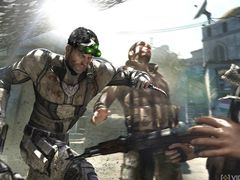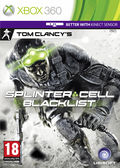You can trust VideoGamer. Our team of gaming experts spend hours testing and reviewing the latest games, to ensure you're reading the most comprehensive guide possible. Rest assured, all imagery and advice is unique and original. Check out how we test and review games here
Splinter Cell: Blacklist was one of several impressive games shown by publisher Ubisoft at E3 earlier this month, but it wasn’t without its critics. We sat down with Ubisoft Toronto producer Andy Wilson to find out just how big a departure Sam’s new game really is.
VideoGamer: Blacklist looks like a very good game but it doesn’t look much like Splinter Cell. Is this still a stealth title?
Andy Wilson: Absolutely. One of the things that we’re building into the game is choice, choice of the way you play. If you want to take the action approach then you can, but you can stealth through the game as well. We have multiple paths and ghost paths where you can stealth your way through. We’ve shown a very small snippet of the game and we’re going to be showing a lot more over the coming months where we’ll be demonstrating all of those things and the way in which player choice manifests.
Q: So the decision for the E3 demo was to show loud action?
AW: It wasn’t really about showing action in particular, but showing some of the things that have changed and been taken forwards. But then it’s also about showing some of the things that have come back – some of the classic gadgets and things like that. There are stealthy moments in the longer demo which we’re also showing here, so it’s not all guns blazing. And certainly, yeah, we wanted to bring Sam back in a very big way. But there are a lot of different things that we’re going to be showing off.
Q: The Splinter Cell series has been running for a long time and gone through various iterations, and stealth itself has changed a lot with the likes of Conviction and the Batman: Arkham games. How is stealth going to work in Blacklist?
AW: The ultimate version of stealth is never being detected by anybody. You can absolutely take that approach. You can sneak your way through entire missions and maps not being detected, taking people out without springing any alarms. Or alternatively, you can take the ‘Conviction’ approach, taking your time and lining a few things up, Mark & Execute and use killing in motion, and have the satisfaction of actually feeling like Sam Fisher by throwing yourself around the battlefield. Stealth is going to operate in the traditional way you would expect it to. I think people will definitely see that when they see more hands-on time. We’re not just bright daylight in the Middle-East. We’ve got locations all over the world. There are a tonne of locations that are at night as well, so the traditional night-time gameplay is coming back. It’s all in there.
Q: The louder stuff that you did showcase was spectacular. Is the emphasis on action a step towards trying to capture the Call of Duty audience?
AW: For us, it’s definitely about setting up a credible threat in the game. The Blacklist is supposed to be the most severe threat that the US has ever faced. Obviously, when some of those attacks happen we’ve got to make that spectacular and credible. The thing about Splinter Cell and particularly about Blacklist is, there’s a lot of systemic gameplay in there. There’s a huge variety in terms of the gadgets and weapons, and multiple ways of playing it. It’s not about big set-pieces.
Q: It’s not going to be taking the same kind of approach as CoD, then?
AW: Splinter Cell is Splinter Cell. It’s not Call of Duty and never will be. It’s a very separate intention that we’ve got with this game.
Q: Another thing that people picked up on is the change of voice actor. It’s not Michael Ironside any more. What was the thinking behind that? Can you tell me who the new guy is?
AW: The new guy is Eric Johnson. He’s actually an old friend of Michael’s. The thing is, with Blacklist we’re using very, very high-end motion capture technology, and it’s full performance capture. It isn’t just their face but everything. We’ve got a combat expert who’s in training our actors, throwing them about all over the place in brutal situations, and that requires an incredibly physicality that Michael freely admits he’s not capable of doing any more. To make the most out of that technology and to really capture the performance it was time to move to a new actor. So we brought in Eric and it’s working great so far. Everyone’s very happy, Michael’s very happy, so it’s a positive change for us. It needed to happen.
Q: Has Sam Fisher himself changed, or will it be the same character shining through?
AW: He’s going to be the same character but we’re showing more of his character. He’s working with a team now: Fourth Echelon is a team, and you’ll see him interacting with that team a lot. There’ll be a lot more character development for him but is he very much the same character. With each iteration in a series you’ll make certain changes to your characters in the way they look and the way they speak, but he’s very much still Sam Fisher.
Q: One of the big stand-out moments from the demo was calling in support. What’s the thinking behind Kinect support for Blacklist, and what did you guys have in mind when you sat down to decide how Kinect was going to be used?
AW: There are some obvious things that you can do. Being able to whistle or call someone to distract them is a very basic and obvious use that fits perfectly with classic Splinter Cell moves. In terms of the Kinect use that we’re showing in this demo, obviously Sam has a team. They’re in a mobile operations centre flying around the world. We like the fact that he’s contacting them directly. You as the player are Sam Fisher, calling your team using Kinect to actually call in support at key moments. We’re going to have these moments spread throughout the game across all of the different missions.
Q: Ubisoft has been one of the more pro-active publishers when it comes to trying to find various ways of integrating Kinect into games. Do you think it’s fair to say that there was a teething period with the technology, and do you think we’re moving out of it now and into a phase where developers are a bit more confident in finding the right way to implement this kind of thing?
AW: That’s a good way of putting it: The right way of implementing it and not just implementing it because you can. Certainly, the longer a piece of technology is around the more you can investigate the use of it and integrate it into the game. Obviously we’ve been in development for a while. Kinect launched while we were starting up development on this title, so we’ve had time to think about how we want to use it. And actually, all of those ways fit in very well with Splinter Cell. I guess you see at the start of a technology’s life cycle that certain developers are there at the very beginning. But there isn’t a huge lead time on these things in terms of preparing for it so that’s why a couple of years down the line people are pushing the technology harder, making more use of it and integrating it in more sophisticated ways.
Q: What’s the hardest thing about trying to integrate voice controls in a game like this?
AW: There’s no real technical difficulty with it. Actually, it’s quite easy to work with and integrate. It’s more about the idea and making sure that your ideas are suitable for the type of game that you’re making and not just jamming it in because you can; that you’ve actually found something that players are going to respond to and is going to enrich the experience rather than just be a cheap layer on top of it. You never really want to put gimmicks in your game. All of this technology – and Kinect’s an example of that – definitely has the possibility to add to the experience. It’s worth taking the time to think about how you’re going to do that.
Q: Is Blacklist coming to Wii U?
AW: We’ve not confirmed anything for Wii U.
Q: Were Blacklist to come to Wii U, is the tablet something that inspires you as a developer? Could you see ways in which the Wii U tablet could theoretically be used for a game like Splinter Cell?
AW: Yes. Speaking purely personally, a lot of the stuff that we’re seeing at Nintendo’s conference is definitely more from the core game staples. There’s not a lot of social stuff that they’re showing off. We’ve got a sister title, ZombiU, which is making great use of that pad. Definitely in a game like Splinter Cell you can imagine that there would be good uses for it.
Q: Do you think it’s making more of a pronounced emphasis on making those features work for the hardcore gamers, as opposed to say the stuff that say Microsoft and Sony is doing in terms of focussing on broader, social stuff?
AW: Nintendo has said themselves that they want to try and bring core gamers back into the fold with the Wii U. What we’re seeing is a lot of titles making use of the tablet itself. All of the things I’ve seen on it generally is really extending the experience. It definitely enriches what we’re able to produce. It’s interesting. Whenever you get new technology to play with it’s always a fun time. You get to throw lots of ideas around and work out exactly how you’re going to use it, and someone always has a genius moment and it takes off from that.
Splinter Cell: Blacklist
- Platform(s): PC, PlayStation 3, Wii U, Xbox 360
- Genre(s): Action, Stealth

/https://oimg.videogamer.com/images/2bf5/splinter_cell_blacklist_5.jpg)
/https://oimg.videogamer.com/images/3d45/splinter_cell_blacklist_3.jpg)
